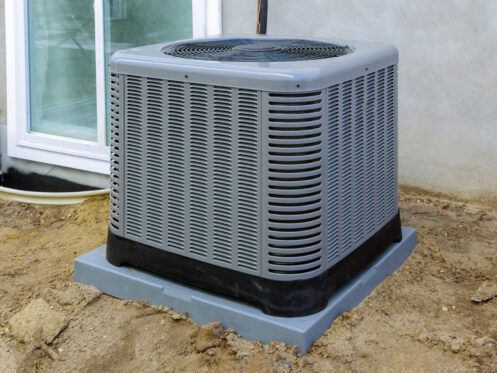If you’ve decided to upgrade your home with a heat pump, you probably have a few questions about the installation process. To make the process easier, we put together a helpful Q&A guide for heat pump installations.
What Type of Heat Pump Do I Need for Zoned HVAC?
If you want your home to support zoned heating and cooling, you’ll need to install a ductless mini-split heat pump. This type of system uses refrigerant lines, connecting an outdoor condenser coil and compressor with one or more indoor air-handling units. Absorption heat pumps use a heat source like natural gas or solar energy to drive the refrigeration cycle, making them suitable for off-grid applications or areas with limited electricity access.
What Heat Pump Works Best With the Local Climate?
Seasons in Portland, OR range from mild and moist in the winter to warm and somewhat dry in the summer, according to the city’s moderate maritime climate. It rains a lot in the city all year, but especially in the winter and autumn. As a result of these weather variations, local homeowners’ heating and cooling requirements tend to vary throughout the year. Despite ground-source heat pumps’ superior efficiency, their higher initial cost can discourage installation in Portland homes. Air-source heat pumps’ advanced adaptability makes them well-suited for the city’s unpredictable weather. Ductless mini-split systems provide the highest efficiency.
Will the Installation Interrupt My Normal Routine?
During the heat pump installation process, minor disruptions to your routine may occur due to noise or a temporary loss of heating and cooling. However, reputable installers know how to minimize disturbances and work efficiently to complete the installation promptly. To keep disturbances to a minimum, always communicate any specific instructions you have regarding the installation process, such as preferred installation times. Discuss any specific electrical requirements or modifications needed for the heat pump installation, including the availability of electrical outlets and circuits. Discuss who is responsible for acquiring the necessary permissions and make sure they are all in order before the installation.
What Size Heat Pump Do I Need for My Home?
Choosing the right size heat pump affects its overall performance. Oversized systems tend to cycle on and off much more than necessary, wasting energy. Undersized units usually struggle to keep the whole home at a comfortable temperature, enduring extreme wear and tear. Properly sized heat pumps have a longer lifespan for heating and cooling the home and result in lower energy bills. They also improve indoor air quality by effectively circulating air throughout the home. Enhanced airflow is paramount to maintaining good humidity levels and preventing moisture-related issues like mold and mildew growth.
Several variables affect choosing the right size heat pump. An expert will know how to calculate the home’s heating and cooling load. This requires evaluating the home’s square footage, counting windows and doors, and analyzing local weather patterns. The findings of this Manual J calculation will provide a precise estimation of the required heating and cooling capacity.
What Areas of the Home Will the Technicians Need Access To?
Technicians may need access to various areas of the home during the heat pump installation, including indoor and outdoor spaces. Indoors, they may require access to utility rooms, attics, or crawl spaces to inspect or install equipment. Outdoors, access to the exterior walls, roof, and yard may be necessary for mounting outdoor units or making connections. Clearing pathways and ensuring accessibility to these areas beforehand leads to a smoother installation process and helps technicians work efficiently.
How Long Does the Installation Process Take?
No two homes are exactly the same, meaning all heat pump installations are different. Factors that affect how long the installation takes include any involved complexities, the size of the system, the type of system, and all required modifications. Some heat pump installations take no longer than a couple of hours. Major modifications, such as upgrading electrical systems, installing new ductwork, or excavating for ground-source heat pumps, can considerably lengthen the process. Obtaining necessary permits and coordinating with utility companies may further contribute to extended installation times.
What Type of Equipment Will the Technicians Use?
Technicians utilize specialized equipment during the heat pump installation, including power tools for mounting units and making connections. They may use refrigerant gauges to test and charge the system, as well as electrical testers to ensure proper wiring. They may employ equipment such as ladders, drills, and wrenches for various installation tasks. The correct tools are essential for a precise installation that satisfies all of the manufacturer’s regulations and guidelines.
What Type of Cleanup Is There After the Installation?
After the installation, technicians typically conduct a thorough cleanup to keep the work area tidy. This may involve removing debris, packaging materials, and leftover supplies. They’ll also dispose of any old equipment or materials removed during the installation process.
What Safety Precautions Will the Technicians Take?
Technicians prioritize safety during the heat pump installation by following industry-standard protocols. This includes wearing appropriate personal protective equipment such as gloves, safety glasses, and hard hats. They’ll also adhere to safety guidelines when working with electricity and refrigerants to facilitate proper ventilation and handling procedures.
Will the Technicians Test the Heat Pump After Installing It?
Yes, technicians will thoroughly test the heat pump after installation to make sure it operates correctly. This includes checking system components, verifying electrical connections, and testing heating and cooling functions. They’ll also make adjustments to optimize the system’s performance, such as calibrating thermostat settings, adjusting airflow, and balancing refrigerant levels. This meticulous testing and fine-tuning allows the heat pump to operate with optimal efficiency and comfort for the homeowner.
Will the Technicians Provide Training On How to Use the Heat Pump?
Yes, technicians usually provide training on how to operate the heat pump after installation. They’ll walk you through the system’s controls, settings, and maintenance procedures, ensuring you understand how to maximize its efficiency and performance. Additionally, they’ll address any questions or concerns you may have about troubleshooting.
Does the Installation Come With a Warranty?
Yes, heat pump installations typically come with warranties to provide assurance and protection for homeowners. These warranties usually cover parts and labor for a specified period, helping homeowners address problems promptly and at no additional cost. It’s essential to review the warranty terms and conditions provided by the installation company to understand the coverage and duration offered.
Will I Receive Documentation Once the Install Is Complete?
Yes, once the installation is complete, you’ll receive documentation outlining the details of the installation process, including any permits obtained, equipment installed, and warranty information. This documentation serves as a record of the work performed and provides important information for future reference or in case of warranty claims.
Making your home more comfortable is much easier with expert HVAC services. Specialty Heating & Cooling LLC offers a variety of installation services for ACs, heaters, heat pumps, water heaters, ductless systems, generators, and more. Give us a call today to schedule a heat pump installation for your home.

